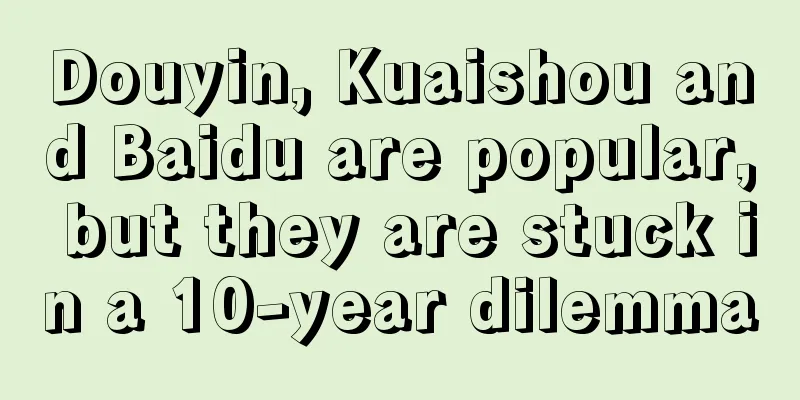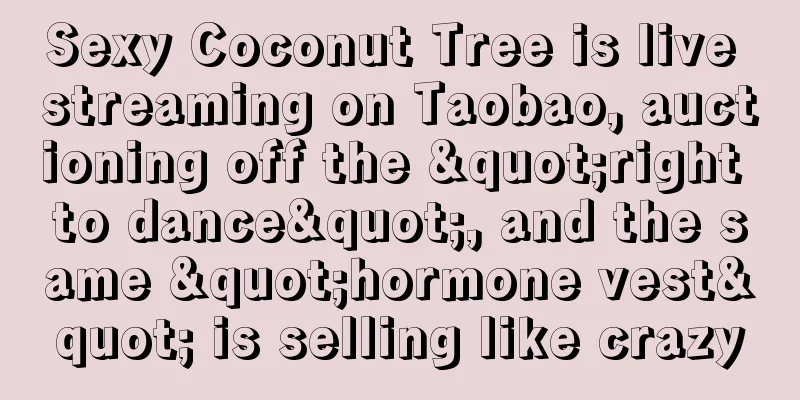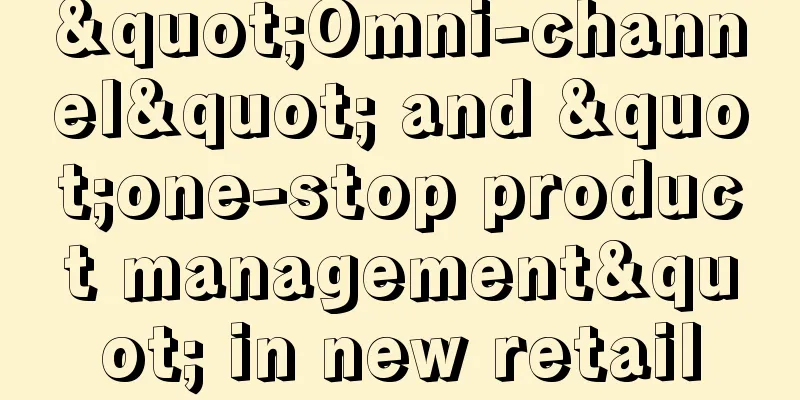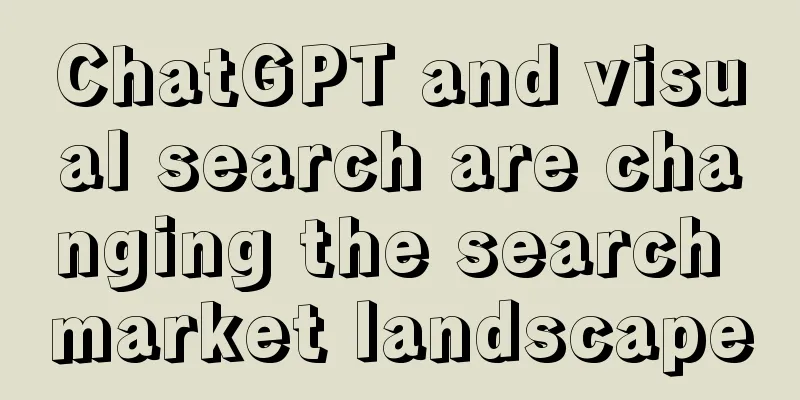Douyin, Kuaishou and Baidu are popular, but they are stuck in a 10-year dilemma

"Generalization" is the inevitable path for the development of almost all platforms. I discovered something very interesting recently. Some time ago, Xiaohongshu celebrated its 10th anniversary, and its founder Mao Wenchao gave a speech on the occasion. At the end of his speech, he mentioned that the significance of Xiaohongshu's existence is to use technology as a pen and humanistic spirit as ink to depict the daily life of the world and soothe the hearts of ordinary people. Regardless of whether this sentence is grammatically incorrect, just a few days after he finished this speech, at the Kuaishou Creator Conference in Shanghai, Wang Jianwei, the head of Kuaishou's commercialization, also mentioned that the most appropriate phrase to describe Kuaishou is " the smell of fireworks in the world is the most soothing to the hearts of ordinary people." All I can say is that people in the Chinese Internet should really read "Three Hundred Tang Poems" more often. Although everyone is talking about mortals, everyone must agree that the mortals mentioned in Kuaishou and the mortals mentioned in Xiaohongshu are definitely not the same kind of people. Behind the "mortal theory", we will find that the most mainstream platforms on the Chinese Internet are converging on a consistent definition of themselves. From the slogan, we can see that Kuaishou is "embracing every kind of life" and Douyin is "recording a beautiful life". It seems that they are just slightly similar, but you have to know that Kuaishou's previous slogan was "recording life, recording you". This was a pretty solid collision. As for Xiaohongshu, after the era of overseas shopping e-commerce came to an end, Xiaohongshu has changed its slogans three times, namely "Good Life in the World", "Mark My Life" and "The Life Experiences of 200 Million People are on Xiaohongshu". This is not all. Don’t forget that there is also a WeChat video account. Its slogan is also very unique, called "Record real life". So life is impossible, right? Our Ah B is the most straightforward: All the videos you are interested in are on Bilibili. Except that the sentence structure was copied by Xiaohongshu, at least it is not "All the life you are interested in is on Bilibili", right? In this issue, I will talk about the relationship between these Internet platforms and "ordinary people". 01A few years ago, I was chatting with a few friends who were working in the Internet industry in Beijing. At that time, Douyin and Kuaishou were fighting fiercely for market share. During the chat, one of my friends used six words to succinctly summarize the positioning of the two companies: "cosmic bar" and "human hand". The name "Universe Toutiao" is often mentioned online. Bytedance's early core product, Toutiao, is located near Wudaokou, the "center of the universe". It is boastful and wants to compete with all the major Internet companies at home and abroad for business. It is also developing very fast. It is called the universe factory, which makes sense. The term "human hands" is quite original. You will find that Kuaishou, in terms of public relations and marketing, always likes to emphasize that you can see real life, real human world, and everyone's life on its platform. I flipped through the advertising case website and found that almost all of Kuaishou's ads have a similar style. I'll pick a few for you to feel. "Your little life is a big event worth recording" "Kuaishou's 500 Hometowns" "See every kind of life on Kuaishou" "Ten years of Kuaishou, for a better life" Of course, I am not saying that Kuaishou is bragging, it is just that Kuaishou’s PR style is so unique and so suitable for this company. Since it became popular in 2015 with the article “The Cruel Story of the Bottom Class”, Kuaishou has been labeled as “down-to-earth”, “rustic”, “down-to-earth”, “stewing itself in an iron pot, and exploding its crotch with firecrackers”, which does not sound so positive. However, the same words can be said in another way: "down-to-earth" is called "real", "down-to-earth" is called "humanity", and "earthy" is called "life". Doesn't it sound much better? Even a little high-end, suitable for CCTV? Two years ago, Kuaishou also published a book called "Kuaishou Anthropology", which tells you that we have the most real and comprehensive human samples. This is a powerful brand marketing technique. This technique was later learned by Douyin, Xiaohongshu, and Video Account. Let me tell you that we have millions of users here, and everyone is recording their real and beautiful life here. Logically speaking, these platforms have hundreds of millions of DAUs and produce millions of pieces of content every day. There is nothing wrong with this statement, but when you put them together, it becomes very strange. Since you are all real life, all kinds of things in the world, why do we need four of them? Isn't one enough? 02This requires mentioning that today's larger platforms, especially algorithm-driven video content platforms, are becoming more and more similar. In my opinion, whether it is the collision of slogans or the PR rhetoric becoming like a repeater, it is just a superficial phenomenon. When all platforms are gradually expanding and becoming generalized, the result is that there is less and less differentiation between platforms. Today, Kuaishou has nearly 400 million daily active users and more than 600 million monthly active users. What does this mean? China has less than 1.1 billion Internet users, and about half of them use Kuaishou at least once a month, and more than a third use it every day. Douyin has more than 700 million monthly active users, Bilibili has more than 300 million, and Xiaohongshu has just exceeded 300 million. This means that in terms of absolute quantity, no matter which platform it is, it is sufficient to call its own users the core base of Chinese netizens. Since we are all from the same base, it is natural that we will look a bit similar. Historically, “generalization” is the inevitable path for the development of almost all platforms. Before generalization, they were more often called “communities”. What is a community? Sociologists have hundreds of different definitions, but most of them include a certain population, a certain region, a certain cultural feature, a certain type of organization, and a social living community composed of these elements. The definition of community on the Internet is similar, except that the location has become cyberspace, which may be a website, an app, or a chat group. Generally speaking, Internet communities have three core elements: people, common culture, and certain ways of interaction. In the early days of PC Internet, there were a lot of communities, from large and comprehensive forums to BBSs focusing on a certain interest, and even different cities had online communities based on locals. In this era, the size of the group is secondary and the common culture is the most important. It can even be said that in that era when the Internet was not yet popular, as long as you could access the Internet and become an Internet user, you would most likely have a certain cultural consensus. Therefore, it was very easy to establish a community. The way of interaction in online communities is collaboration. In the early days of online communities, they were almost all highly collaborative. For example, in the early days, many forums and communities generally established databases. Digital forums had databases of various digital product models, and sports forums had information about players and teams. These were all built collaboratively by community members. In addition, through collaboration and content creation, the community fills in a lot of information that is not available in the mass media field, such as games, animation, etc. Ultimately, many online communities have become information gold mines on the Internet. Of course, community management, similar to forum moderators establishing community systems and managing posting and deletion, is also a form of collaboration. Even the mainstream platforms today, such as Bilibili, Zhihu, and Dianping, had a strong collaborative nature in their early years. People shared resources and accumulated knowledge here. It can be said that the community is something that truly has utopian attributes. 03Regarding the topic of community generalization, I have read a lot of analysis on the Internet, most of which focused on the expansion of the population, leading to the dilution of community culture. This is true, but such a statement lacks a key point, which is the change in the way of interaction, that is, people no longer collaborate. We often underestimate the importance of collaboration. The essence of collaboration is creation, and creation, especially when there is no economic motivation, is very difficult to be self-driven. Even though collaboration is the core interaction method of a community, there are only a few members who can participate in collaboration and produce positive value. As the community develops, more and more non-collaborative people will participate, which will increase the pressure on collaborators. This property was very obvious in the forum era. As the number of users increased, moderators had to spend more time managing the forum, deleting spam posts, and maintaining order. They even had to set up spam areas and expand the management team. At this point, the community that is maintained through collaboration as a form of interaction will reach the limit of its capacity. There are only three possible paths to follow, namely, giving up one of the three: people, common culture, and collaboration. Giving up on the crowd means no longer accepting new members and sticking to the original writing style and cultural identity. In the short term, it can make the community a small and beautiful existence, but in the long run, it also means no more metabolism and will eventually die out. This is a suicidal option. Giving up collaboration means no longer pursuing the value output of community members or the social connections between members. Eventually, it will lose the attributes of the community and become a non-user-driven product. The most typical example is Youku, which has gone from being a website that could have become China's YouTube to a TV station. Finally, it is to give up common culture, which means no longer pursuing common values and aesthetic preferences, and gradually moving towards diversification. But once culture is given up, it is equivalent to losing the "label" that a community relies on most. Without a common culture, why should everyone come together to collaborate? Zhihu’s open registration and Bilibili’s removal of the two-dimensional community are both typical cases. So is the generalization of community doomed to be unsolvable? Here we introduce a new concept called platform. 04When it comes to the birth of the platform, we must start with the way of interaction. In a community, if only a minority of people can participate in collaboration and produce value, then these people will be distinguished from ordinary community members and become two species, creating a new, unequal relationship between them. Thus, a new form of community emerged, and these two species can be simply called "kol" and fans. In this form, KOLs are responsible for creating value, while fans are responsible for consuming value. Collaboration is no longer the only way of interaction, or even the mainstream. The two sides have become in a supply-demand transaction relationship. The platform is the place where supply and demand transactions take place. Nowadays, we find that everything is a platform. Some platforms are native, such as Taobao and Didi, which are originally used for business. But there is another type that is transformed from a community, mainly content platforms, such as Bilibili and Zhihu. Like Douyin and Xiaohongshu, although they have a short history as communities, if we go back to 2017 to look at Douyin and 2018 to look at Xiaohongshu, we can still find traces of communities in them. They can also be classified into this category. When a community is transformed into a platform and the mode of interaction changes from collaboration to transaction, many problems are solved. For example, there is the problem of crowd generalization. There are few people who can participate in collaboration, but there are many people who can consume content and value. If they just come to consume, then no matter how many users there are, the platform can accommodate them. Another example is the issue of culture. In the past, you thought that as more people came, the community culture would be diluted. But in the platform stage, you only need the KOL group to maintain a common culture and values, so that the entire platform can maintain a basic "label". Therefore, both entrepreneurs and investors found that platforms are good and much more advanced than communities, so they began to transform from communities to platforms. However, things are not that simple, and the platform cannot be changed just because you say so. There are many hurdles to cross. For example, the consumption model. In an environment where we generally have no habit of paying for content, how to design a consumption model so that people have enough motivation to continue creating is a very important issue. The introduction of advertisers, the popularization of online payment, the rise of 4G and the involvement of venture capital all played an important role. Of course, many platforms have not yet figured this out. There is also a threshold for product form. In the past, the forms of interaction were all posting and replying, which still retained a lot of "collaboration" marks. These must be removed and replaced with likes, favorites, forwarding, and rewards, which are more interactive methods with "consumption" attributes. There are also many platforms that have not designed their product forms well, which ultimately affects their development model. In short, the transformation from community to platform is not easy, but rather a life-and-death struggle. I have to add here that community and platform are not two distinct things. On the contrary, even in today's Douyin, Kuaishou and HongB, many attributes of collaborative creation are still retained, and even the earliest communities have kols and fans. 05So why are platforms becoming more and more similar? Just as a large number of communities in the past were transforming into platforms, another trend was also quietly happening, that is, the popularization of smartphones and the massive influx of venture capital into China's Internet industry. The combination of these two things resulted in a large influx of new netizens into the Internet, and the industry entered an era of scrambling to expand its user base. The transformation of communities into platforms itself requires the expansion of users, especially consumers, so platforms with over 100 million users, over 100 million monthly active users, and even over 100 million daily active users have emerged one after another. Until now, everyone has hundreds of millions of users, which can be regarded as the basic base of netizens. Since they are all basic, the demands will inevitably become closer and closer. Many people have a misunderstanding about these platforms. When they mention Xiaohongshu, they think of Citywalk, holding a cup of coffee and doing nothing all day long; when they mention Kuaishou, they think of stewing yourself in an iron pot and setting off firecrackers to make your crotch explode; when they mention Bilibili, they think of 2D otakus and housegirls. These stereotypes are not wrong, but they are definitely not responsible statements. First of all, the expression of the KOL on the platform and the status of most of the fans are two completely different things. The ratio of the number of people who can stably output value on a platform to the number of ordinary consumers may be 99 to 1. You can't use 1% of the content to fit the status of 99% of the people. This is the simplest math problem. Think about it again, there are hundreds of millions of users on each platform. It is unlikely that the users of one platform and the users of another platform are completely in a "either me or you" and completely mutually exclusive situation. It is also impossible that the taste of some hundreds of millions of people is completely higher than that of other hundreds of millions of people, and their value orientation is completely different from that of other hundreds of millions of people. In fact, most people probably use 2-3 software at the same time. Since everyone's users are the basic base, and under the supply and demand transaction model, creators must please consumers in order to gain popularity and money. The result is that the content of the platforms becomes more and more similar, and the public opinion environment becomes more and more similar. This brings us back to our initial conclusion. The so-called concepts of "life", "fireworks", "mortal heart" and so on are just because these words are the biggest and all-purpose words that can cover everything. Chasing stars and watching dramas is also my life, playing Frisbee and paddle boarding is also my life, fishing and farming is also my life, and quarreling with my boss in the conference room every day is also my life. What is not life? What is not the flavor of life? Who is not a mortal? 06But what we should really be wary of lies beyond these words. Let me briefly talk about three points here. As communities fade away, platforms become more powerful and more similar, and we will find that the mainstream cyberspace is becoming more and more boring. Coupled with the precise feeding of algorithms, we will find that all platforms are the same when it comes to browsing. If you like sports, Kuaishou will recommend sports to you, and Xiaohongshu will also recommend sports to you. Bloggers are also the same few people, and everyone is creating a water source for the world and sending a video back and forth. However, these contents cannot be discussed in depth or thoroughly, and the forms are similar. Just like many cities, although they are all called by different names and have different geographical locations and characteristics, when you walk in, you will find that they are all similar reinforced concrete, wide roads and elevated roads, public building facades and closed communities. Outside the community, there are also similar Mixue Ice City and Zhengxin Chicken Steak. It's not bad, it's just boring. This is the first point. The second point is that the so-called "life" and "ordinary people" seem beautiful, but there is a certain hegemony behind them, that is, the hegemony of the so-called "ordinary". It requires you to be down-to-earth, but not rustic or weird. It requires you to show beauty, but not floating, expensive, or artificial. People like me who love to watch quarrels on various platforms have now come to a conclusion. Most of today's Internet quarrels will eventually turn into disputes among "ordinary people". That is, my life represents the public, but yours does not. If you are interested, I will do a special episode to talk about the history of Internet verbal wars and how today's verbal wars came about. This is also the reason why Internet platforms are keen on promoting "life" and want to write it into their slogans. Finally, this is the point I want to say the most. "Life" is good, "fireworks" is also good, but through the phone, you are always just a spectator of life. The more any platform promotes "real life here", the more it wraps up a life for you to see. You can only see one aspect, you can't go in and experience it. I read "Salt Town" a few days ago. The author Yi Xiaohe wrote in the afterword: Yan Town is only a dozen kilometers away from the urban area of Zigong where I grew up. It is hard to imagine that for decades before, it was the part of China that I knew nothing about. The fireworks in the mobile phone can not really soothe anyone's mortal heart. The millions of lives on the platform do not really belong to you. What you can have is only the life that belongs to you after you put down your mobile phone. References:
Author: IC Lab; Official Account: IC Lab (ID: InsightPlusClub), looking at business from the perspective of brand. |
<<: 12 words of healing copywriting, extremely comfortable ~
>>: Decoding WeChat Reading: How to Make Users Addicted
Recommend
After communicating with friends who made money on TikTok, I summarized these 20 ways to play!
Nowadays, many people have joined the Douyin game....
90% of people don’t make money by live streaming slicing and selling goods!
Why don't celebrities and internet celebrities...
What is the use of Amazon's shopping cart? What are the conditions?
There are still some barriers to getting a shoppin...
ChatGPT and visual search are changing the search market landscape
With the rapid development of artificial intellige...
What does it take to open a store on a cross-border e-commerce platform? How does one open a store on a cross-border e-commerce platform?
Compared with domestic e-commerce platforms, many ...
February marketing calendar is out, a must-have tool for following hot topics and doing marketing
January is not over yet, and the February marketin...
When “refund only” becomes the standard, who is professionally “fleecing”?
After major e-commerce platforms launched the &quo...
Do you have any misunderstandings about the rules and logic of Tik Tok?
This article is very long and it is not easy to fi...
Using data to mine business growth points? These 3 methods are super practical!
In today's highly competitive business environ...
From the three key words of e-commerce development in 2023, we can see the trends and opportunities in 2024丨In-depth
The author of this article analyzes the developmen...
Will Shopee gain traffic if I keep uploading products? What should I pay attention to?
Some of my seller friends are opening a store on t...
How to set the delivery time in Shopify? What is the setting method?
Nowadays, more and more merchants are opening stor...
How to do e-commerce on Amazon? Specific methods introduced
Nowadays, many businesses will join cross-border e...
How does Pinduoduo gain popularity? How to do it specifically?
For Pinduoduo stores, popularity is very important...
Let’s have some dried dry goods: 3 ways to find potential incremental categories
It is an industry consensus that fast-moving consu...









